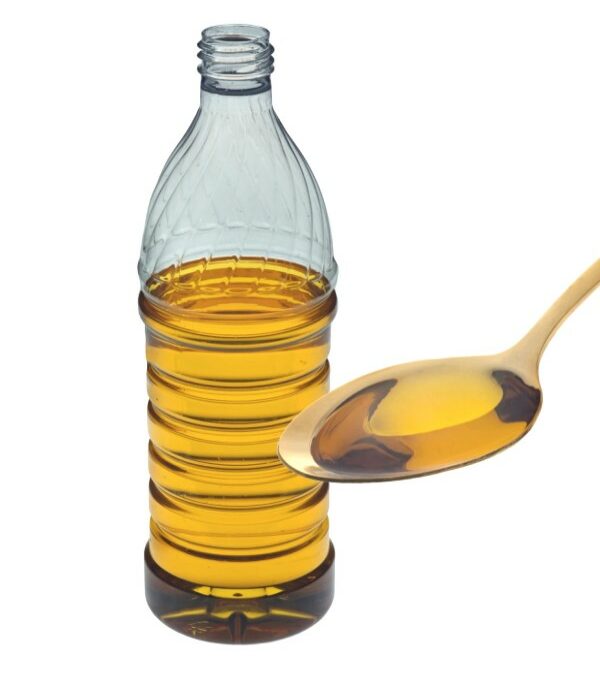“When eating out, is it better to accept that they’re most likely going to use low quality oil when cooking your food or should you ask them to sub olive oil even though it doesn’t do well with heat?”
This is such a great question that never ceases to bring me distress. The greatest compromise we make when we eat out is the quality of the fat being used to cook the food. It is absolutely tragic.
I used to ask at restaurants what type of oil they use, but at a certain point, I stopped because it was too damn depressing for me and awkward for the people I was eating with. I can’t think of a single time that the server wouldn’t come back and say, “Vegetable oil.” This is never a good sign and is not specific or accurate enough for me, so then I would have to be really assertive and say, “Ok. I know you’re busy, but there are lots of different vegetables. Can you find out which one please?”
Usually, it’s canola oil, which isn’t even a vegetable. It’s a seed. And then, sometimes it would be corn or soy and the worst-case scenario is cottonseed oil.
We don’t eat cotton seeds and rape seeds (which is where canola oil comes from), so why would we want to consume their oils?!
And then, there was the time when I asked the same restaurant twice and got two different answers. The first time, the server came back from the kitchen and said, “Olive oil.” EUREKA! Then, I returned to the restaurant, asked again and got the more accurate answer, “We use a blend of canola and olive oil.”
Sigh. More disappointment. I can guarantee you that it’s more canola than olive. Speaking of blended oils…even if you ask for olive oil, how do you know you’re getting it?
You don’t! Consider this:
“Costs of virgin olive oil are high when compared to other commonly used vegetable oils, making it prone to adulteration with less expensive oils in order to increase profits. Most common adulterants found in virgin olive oil are seed oils, such as sunflower, soy, corn and rapeseed oils as well as nut oils, including hazelnut and peanut oils” [i]
So we can’t trust the kitchen, and we can’t trust the labels. It is a very sad state of affairs.
Have you ever tried asking for butter at a restaurant? 99% of the time you get margarine. But they will tell you it’s butter! Seriously, I’ve argued with servers and managers about this. Ultimately, saying some version of, “I know you mean well, but that’s not fucking butter.” Only high-end restaurants will bring you actual butter and it will be solid at room temperature, which people will bitch about because it’s so hard to spread on your bread! Real food is just so inconvenient (yes, I am being sarcastic).
Don’t even get me started on Whole Foods. The most ubiquitous health food store in the country promotes a plant-based, low-fat diet and coats all of their prepared food in canola oil. We can’t even eat well in a freaking health food store!
The truth is that the only way to have control over what’s in your food is to cook everything yourself, but for many people (myself included) that is simply unsustainable. I travel, get tired of cooking, and want to socialize, and way too many people have to work overtime and hold down two jobs just to survive! And they’re supposed to go home and cook?! Come on. Cooking is wonderful when it can happen, but we definitely need to hold it with the complexity that it deserves. There are socioeconomic pressures that affect our ability to be in the kitchen.
Before I offer you some strategies for dealing with poor quality fats when eating out, I want to make sure that we are all on the same page in terms of the conversation around fat.
Out of the three macronutrients, fat is hands down THE most important one. There is no physiological necessity for carbohydrates. Protein is primarily used for structure in the body, but fat is used for both structure AND energy.
Each one of your cells sits in a water bath. Fat is what gives your cells integrity. Cell membranes need structure from saturated fats and they need flexibility and the ability to communicate via essential fatty acids, which are DHA and EPA. These fats are called essential because if you don’t eat them, you don’t have them. They are primarily found in cold water fish, i.e. these fats keep the fish from freezing, and in the fat of animals that live on pastures (think egg yolk and grassfed ribeye).
I know that we have all been brainwashed to think that fat is bad – poor quality science is a real thing and marketing works. If this is still a struggle for you, check out The Big Fat Surprise by Nina Teicholz. She tells the full story, and it is absolutely maddening.
Ok, so here’s where things get interesting in terms of why these seed and vegetable oils used by restaurants destroy our health…
First, we have to recognize that heat, light and oxygen have the potential to damage fats.
Now, I want you to visualize a chain of carbon molecules with hydrogen molecules attached to them. This is a saturated fat, as all of the carbon molecules are saturated in hydrogen molecules. These are stable fats solid at room temperature and can hold up to the heat of cooking. This is why I cook with coconut oil, lard and ghee (clarified butter).
Next, visualize that same chain of carbon molecules with hydrogen molecules attached to them, but remove one of the hydrogen molecules. Now you have one unstable carbon molecule that is looking for some action, “Hey, where’s my partner? I’m lonely over here!” This is called a monounsaturated fat where one bond is missing. These are things like olive oil, avocado oil and macadamia nut oil. These are liquid at room temperature and solidify when refrigerated. They are slightly unstable. You can sauté with them, but that’s the extent of the stress they can handle. These are really good for you, too, just like saturated fats.
Finally, visualize that same chain of carbon molecules with hydrogen molecules attached to them, but remove multiple hydrogen molecules – take away one here, then two and maybe even three or four in a row. Here we have a polyunsaturated fat where there are many missing bonds. These are highly unstable and can damage VERY easily. Sure, you can get away with cooking your eggs, fish or meat, but past that, any additional heat or extraction of oil would be detrimental. These fats are found in nuts and seeds, like flax, walnuts and pecans, but guess what? They are also found in all the shitty oils I mentioned earlier: corn, canola, soy, and cottonseed oils.
When you eat in a restaurant, your food is fried in these oils and the salad dressings contain them and they are toxic to the human body. They contribute to our ongoing states of inflammation, which is a set up for chronic disease. I almost forgot to say that many restaurants re-use their oils from one day to the next. Gag me!
Bottom line: when health experts and government guidelines started to demonize animal fats and recommended limiting them, two things happened. Carbohydrate consumption went up (we have to get energy from somewhere), and we started to eat way too many of these unstable vegetable and seed oils.
To be practical for a moment, just look at those foods: corn, canola, soy and cottonseed. Is corn oily? No. As I said earlier, we don’t even eat rape seeds or cotton seeds for food, right? And if I threw a soybean at you, it would hurt – they are hard little nuggets! Getting oil out of these foods requires industrial processing – a ton of heat and a ton of pressure and who cares about light exposure at that point. What I’m trying to say is that you can’t make these at home! They are refined foods.
Hopefully, you can now see that these oils are a metabolic nightmare.
But all is not lost! Even in this bleak situation, you can still eat in peace. Here are 6 tips:
- Bless your food and your body and be grateful and move on. Food isn’t just about it’s nutritional content. It’s about connection. Connection to the Earth through the food and connection to each other. I do believe that how and what we think about our food matters. Going into a restaurant and saying to myself, “Prepare to be poisoned” is not helpful. So enjoy yourself as much as possible. That can make positive difference. Surrender and let go.
- If you live in Austin, support a local restaurant called Picnik. They primarily use avocado oil and butter in their kitchen, which is obviously a step in the right direction. I frequent this spot because I don’t have to worry about poor quality ingredients.
- Bring your own salad dressing or tune into this company. They make good quality oils in travel packs so you just need to ask your server for fresh lemon slices or vinegar and you’re good to go for a healthy salad. Their nut butters are awesome too and are staples in our home.
- When we travel, we also try to stay in a place that has a small kitchen, so we can at least eat a good breakfast and might even cook up a lunch or dinner sometimes.
- When you do eat out, don’t eat fried foods. It’s a simple step that will help you avoid an inflammatory cascade.
- Join the Nutrition Coalition, which is fighting the corporate and government giants to remove these foods from our food supply. So instead of taking on the burden yourself and be disappointed over and over again that nothing is changing, put your energy behind something that is doing the work for you.
I hope this is helpful information to you and answers your question. There is no doubt in my mind that everyone reading this blog carries the burden of consciousness. It’s not easy; ignorance is sometimes bliss. But ignorance also never changed anything.
So keep on trucking, my friends! Enjoy your good fats when you can and let the rest go.
Eat out in peace!
Love,
Charlotte
If you loved this blog and want more goodies just like it sent to your inbox, sign up for my weekly newsletter!
[i] Maggio, Rubén M., et al. “A novel chemometric strategy for the estimation of extra virgin olive oil adulteration with edible oils.” Food Control 21.6 (2010): 890-895.

